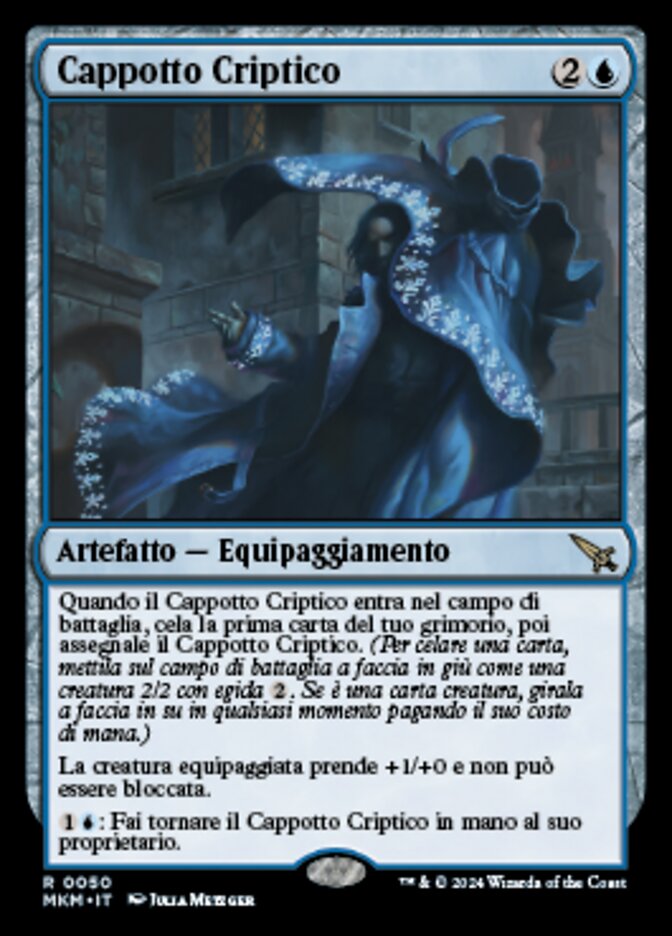
Cappotto Criptico {2}{U}
Artefatto — Equipaggiamento
Quando il Cappotto Criptico entra nel campo di battaglia, cela la prima carta del tuo grimorio, poi assegnale il Cappotto Criptico. (Per celare una carta, mettila sul campo di battaglia a faccia in giù come una creatura 2/2 con egida {2}. Se è una carta creatura, girala a faccia in su in qualsiasi momento pagando il suo costo di mana.)
La creatura equipaggiata prende +1/+0 e non può essere bloccata.
{1}{U}: Fai tornare il Cappotto Criptico in mano al suo proprietario.
Illustrated by Julia Metzger
- Standard
- Legal
- Alchemy
- Legal
- Pioneer
- Legal
- Explorer
- Legal
- Modern
- Legal
- Historic
- Legal
- Legacy
- Legal
- Brawl
- Legal
- Vintage
- Legal
- Timeless
- Legal
- Commander
- Legal
- Pauper
- Not Legal
- Oathbreaker
- Legal
- Penny
- Not Legal
Toolbox
Buy This Card
Notes and Rules Information for Cappotto Criptico:
- Only the English version of a Magic card receives Oracle updates and errata. View this card in English. (Scryfall note)
- Because face-down creatures don’t have a name, they can’t have the same name as any other creature, even another face-down creature. (2024-02-02)
- You’ll still cloak the top card of your library even if Cryptic Coat isn’t on the battlefield as its first ability resolves. (2024-02-02)
- Cryptic Coat has no equip ability. Without assistance from other cards, there’s no way to attach it to a creature other than with its first triggered ability. How cryptic! (2024-02-02)
- To cloak a card, put it onto the battlefield face down. It becomes a 2/2 face-down creature card with ward {2} and no name, mana cost, or creature types. It’s colorless and has a mana value of 0. Other effects that apply to the permanent can still grant it any characteristics it doesn’t have or change the characteristics it does have. (2024-02-02)
- Any time you have priority, you can turn a cloaked permanent you control face-up by revealing that it’s a creature card (ignoring any copy effects or type-changing effects that might be applying to it) and paying its mana cost. This is a special action. It doesn’t use the stack and can’t be responded to. (2024-02-02)
- If a cloaked creature would have disguise (or morph) if it were face up, you may also turn it face up by paying its disguise (or morph) cost. (2024-02-02)
- Unlike a face-down creature that was cast using a disguise or morph ability, a cloaked creature may still be turned face up after it loses its abilities if it’s a creature card. (2024-02-02)
- If a double-faced card is cloaked, it will be put onto the battlefield face down. While face down, it can’t transform. If the front face of the card is a creature card, you can turn it face up by paying its mana cost. If you do, its front face will be up. (2024-02-02)
- At any time, you can look at a face-down spell or permanent you control. You can’t look at face-down permanents or spells you don’t control unless an effect instructs or allows you to do so. (2024-02-02)
- If a face-down creature loses its abilities, it can’t be turned face up with a disguise ability because it will no longer have a disguise ability (or a disguise cost) once face up. (2024-02-02)
- Because the permanent is on the battlefield both before and after it’s turned face up, turning a permanent face up doesn’t cause any enters-the-battlefield abilities to trigger. (2024-02-02)
- A permanent that turns face up or face down changes characteristics but is otherwise the same permanent. Spells and abilities that were targeting that permanent and Auras and Equipment that were attached to that permanent aren’t affected unless the new characteristics of the object change the legality of those targets or attachments. (2024-02-02)
- Turning a permanent face up or face down doesn’t change whether that permanent is tapped or untapped. (2024-02-02)
- If a face-down spell leaves the stack and goes to any zone other than the battlefield (if it was countered, for example), you must reveal it. Similarly, if a face-down permanent leaves the battlefield, you must reveal it. You must also reveal all face-down spells and permanents you control if you leave the game or the game ends. (2024-02-02)
- You must ensure that your face-down spells and permanents can be easily differentiated from each other. You’re not allowed to mix up the cards that represent them on the battlefield to confuse other players. The order in which they entered the battlefield should remain clear, as well as what ability caused them to be face down. (This includes disguise, cloak, and in games involving older cards, morph and manifest, as well as a few other effects that turn cards face down.) Common methods for doing this include using markers or dice, or simply placing them in order on the battlefield. (2024-02-02)
- If something tries to turn a face-down instant or sorcery card on the battlefield face up, reveal that card to show all players it’s an instant or sorcery card. The permanent remains on the battlefield face down. Abilities that trigger when a permanent turns face up won’t trigger, because even though you revealed the card, it never turned face up. (2024-02-02)